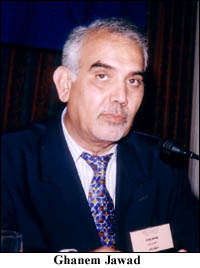 |
| Vol. 6 No. 5 | Table of Contents MEIB Main Page | May 2004 |
| | Interview: Ghanem Jawad Head of the Culture and Human Rights office of the al-Khoei Foundation |
 |
The Imam al-Khoei Benevolent Foundation is an international charity established in 1988 by Grand Ayatollah Sayyid Abdul Qasim al-Khoei, the highest ranking cleric in the Shiite seminary of Najaf until his death under house arrest in 1992 and the architect of a distinct school of Shiite theology emphasizing tolerance, nonviolence, and social egalitarianism. The foundation, which moved its headquarters to London following the failed Iraqi Shiite uprising of 1991, was directed by al-Khoei's son Taqi until his death in 1994 and then by his second son, Abdul Majid. It expanded rapidly in the 1990s, establishing schools, hospitals and other charitable institutions across the globe from India to Africa. Shortly after returning to Najaf in April 2003, Abdul Majid al-Khoei was murdered by followers of radical Shiite firebrand Muqtada al-Sadr.
This interview was conducted by Mahan Abedin on May 13 at the al-Khoei Foundation complex in west London.
 |